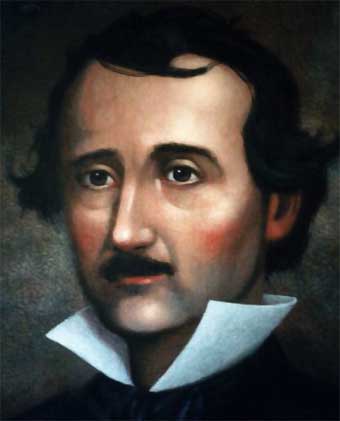
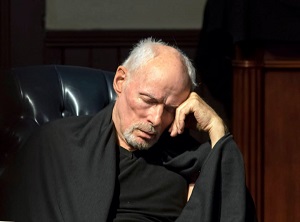
You decide to work on the Edgar Allen Poe’s captivating and dark image-rich poem, “The Raven.” Shadowy impressions of that ebony bird posed upon the bust of Pallus had haunted your thoughts for decades but it was only recently that you imagined dramatizing it. Then when you find yourself tapping your feet to the rythym of a jazz musician’s trumpet at The Garth Gallery in Columbia, Pennsylvania, the idea bursts into your consciousness.
So you read the poem. How in Hell can you work this into a theatrical presentation? Theater involves a special kind of communication with spectators: the script is the guide, but the breath and the voice in all of their variations bring life to the characters, as do the movements, the forms that the body assumes, the costumes, the lighting, the pauses, the direction of intent for each action…
One thing is to read a poem to yourself in front of your fireplace. Quite different is to recite it, hear the words resound. But how are you supposed to read it? In this case Poe helps and hinders at the same time. His verse is rich in images, is incredibly rhythmic and utilizes repetition as an essential recourse.
However, what you propose is theatrical. So you have to ask yourself other essential questions: who is the protagonist? What is the role of the author, Poe, in the performance. What significance do the graphic images have? (midnight dreary, tapping, rapping, wind, nevermore, bust upon my chamber door, ebony fowl…) Is there an underlying meaning, does Poe want to “say” something with this poem? Should I say the lines rhythmically—as in the poem itself—or should I perhaps break them up into what might be closer to the rhythm of speech of a man living alone? What words or phrases should be stressed? How should the strong emotions of the protagonist be treated—his melancholic sense of loss for Leanore, the growing sense of dread, fear and frustration with the raven.
I decided first to memorize the poem (not an easy task) and then step by step let the movements emerge, the dress, the idea of connecting up with Shakespeare’s Macabeth, the tomorrow, tomorrow and tomorrow speech where he laments the death of his wife and anticipates his own demise. Then a basement, in front of the boiler, the rehearsing began. By the night of the performance—April 18th—I had barely gone through the whole idea three or four times.
One interesting aspect of the performance developed with the ingenuity of the producer and master of ceremony, Louise Imm-Cooper, who suggested combining with poets who would read their poems. However, since not many were available we selected poems which we placed in a basket—to be chosen and read by participants in the event. We were greatly surprised when most of them did so, and very well!
Following the performance there was an exchange of ideas concerning the event and then I asked numerous spectators their critical analysis.
Bill Adams: “I really enjoyed your interpretation. Many years ago I had heard the Raven’s lone, “nevermore” done in a gloomy eerie fashion which suggests anthropomorphic quality. The generally accepted reasoning is Poe choose the Raven and designed the wording of the poem around a “bird brain” who was simply taught to say its name, a mindless automaton and the way in which you said it supported that assumption, so I was curious if that play any part in your presentation. The way you presented it was in keeping with what is thought to be Poe’s so you are in good company.”
Describing himself as a relative moralist, he asserted that there is neither a right nor a wrong way of doing things. “If the purpose of your performance was to do it as Poe would have done it, then a host of issues become important. But you were doing your own interpretation and therefore the only judge is you yourself as to how well you did it.”
Carol Galligan, painter: “I was thinking about the rhythm yesterday. My son ‘brought me up’ with is percussion studies. The sounds of the beat of a drum is so familiar to me. Had you ever thought of just doing the ‘dance’ (I call it a ‘dance’) of all the movements without words, only making sounds with each movement? Maybe just the beat of a drum. I would have to be a good drummer…an educated percussionist who can make the drum speak with you (Poe). I think I experienced the piece as a dance. I loved the use of black…oh, and then the blowing out of the candle…so significant!!! I love the way you turned a black piecve of material into a pair of wings!!! Beautiful! I do not object to improvisation…absolutely not! I can’t be objective about that. It’s the way I paint!!! I also call what I do a dance.”

The Raven visits the Garth
You are alone, in silence, in darkness, with your fantasies, all is a shambles, and sadness sees no light. A verse enters your memory, images flitter in the dim reflected light of the fireplace. Edgar is there slumped over and mumbling about a strange visitor, an illusion from the past whispers in your ear: “It’s the Raven, it has returned! Wake up! Oh, is it you my love, Lenore is it you?”
Night of poetry reading and dramatization of “The Raven.” Come read your favorite poem, listen to others read theirs, then grab your seat for Alfred Hopkins’ dramatization of Poe’s memorable verse.
April 18th 6:30 in the evening at The Garth, 22 South 2nd Street, Columbia, Pennsylvania. Booking: 7176840651. Donation: $7.00.
Since Biblical times moneylending has been a source of profound conflict—and it continues to haunt financial, social and cultural life in most parts of the world. When William Shakespeare wrote “The Merchant of Venice” Christianity objected to charging interest on loans, an attitude that was not shared by the Jewish community. This gave way to numerous confrontations and was also used to flaunt anti-Semitism. Today, as well as in 1596, lending money gives the lender power to impose conditions on the borrower.
In Shakespeare’s play Bassanio, a young Venitian noble, is in love with the beautiful and wealthy Portia of Belmont, but having squandered his estate he needs 3,000 ducats to subsidize wooing her. So he brings his problem to his friend Antonio, a rich merchant who has often bailed him out of financial difficulties. There’s a snag, however, because Antonio’s ships and merchandise are busy at sea. So he tells Bassanio that he will cover him if he can find a moneylender. That’s where the Jewish lender Shylock appears, asserting he will not collect interest, as is his custom, but will demand a pound of flesh to be taken near the heart should the loan go to default.
As in all of Shakespeare’s plays, the plot gets enormously complicated, but what continues to be discussed is precisely the role of Shylock, whether he is to be considered sympathetically or as an opportunistic abuser, whether there is in this conflict a touch of anti-semitism.
In the opening night of the play last night at the British Arts Centre Sylock—played convincingly by Sean Wellington—approaches the audience in defense of his determination to collect the pound of flesh:
“Hath not a Jew eyes? Hath not a Jew hands, organs, dimensions, senses, affections, passions; fed with the same food, hurt with the same weapons, subject to the same diseases, heal’d by the same means, warm’d and cool’d by the same winter and summer as a Christian is?”
Does Shylock collect the debt? He defends his right to do so referring to the laws existing at the time. The hedge funds in Argentina's debt crisis also say they are acting according to the law. But we suggest that the reader see the play and conclude for himself or herself how the issue is resolved. In this version of the play directed by Alicia Vidal, the character of Sylock occupies an intermediate position between the scoundrel and the proper man of finance.
Vidal chose to break down the Shakespearean structure of acts and scenes into short and agile sequences stressing the essence with no other adornments than a table, a chair, some cloths and money boxes. The actors themselves bring on or take off the props, giving the show a participatory feeling.
Although the text and actions are abridged, they are maintained intact in their essence. The costumes are modern, yet retain touches of the Shakespearean era. As a result the play is entertaining, relatively light in substance and sustains good dramatic rhythm until the end, keeping the audience’s attention focused on how the conflict will be resolved. The young actors of the Pest Group give a fresh uptodateness to the play.
The Merchant of Venice, 19, 20, 26 and 27th of September at the British Arts Centre, 1333 Suipacha street, Ciudad de Buenos Aires, Argentina.
Cast:
Antonio Miguel Almirón
Gratiano Paul Parsley
Bassanio Guido
Nerissa Tatiana Gurevich
Portia Bárbara Bernardi
Shylock Sean Wellington
Launcelot Franco Gariballi
Jessica Ana Spagnolo
Lorenzo Juan Pablo D'Aqui
Morocco/Tubal Diego Romero
Director Alicia Vidal
Production Cecilia Verga
Voice Coach Jorge Verga
Costumes Natalia Bernardi
Subtitles Natalia Bernardi
Lights Daniel Compaya
Facebook: www.facebook.com/Peripatetic
Hello friends, actors and students! If you want to work on a monologue or short story, bear in mind our workshop at Mexico 926 (Phone 4342 4936), near the Independencia subway stop. Diction, use of body, projection, role-play, working the context and finding the secrets beyond the lines. You can find material at http://thehopkinstheatreworkshop.blogspot.com and you may also work on your own monologues or stories.
We request that you confirm your participation previously at 4342 3588 or 4342 4936 or via email: hopalfred@gmail.com
To pay or not to pay, that is the question:
Whether 'tis nobler in the mind to suffer
The slings and arrows of outrageous buzzards
Or to take arms against a sea of holdouts,
And by opposing end them. To die--to sleep--
No more; and by a sleep to say we end
The heartache, and the thousand natural shocks
That flesh is heir to. 'Tis a consumation
Devoutly to be wish'd. To die--to sleep.
To sleep--perhance to dream: ay, there's the rub!
For in that sleep od death what dreams may come
When we have shuffled off this mortal coil,
Must give us pause. There's the respect
That makes calamity of so long life.
For who would bear the whips and scorns of the buzzards,
Th' holdout's wrong, the proud man's contumely,
The pangs of despis'd love, the law's delay,
The insolence of office, and the spurns
That patient merit of th' unworthy takes,
When he himself might his quietus make
With a bare bodkin? Who would these fardels bear,
To grunt and sweat under a weary life,
But that the dread of the holdouts and buzzards--
The undiscovered off shore financial paradise
From which no traveller returns--puzzles the will
And makes us rather bear those ills we have
Than fly to others that we know not of?
Thus conscience does make all of us doubt,
And thus the native hue of resolution
Is sicklied o'er with the pale cast of thought,
And enterprises of great pith and moment
Theatre Workshop in English
Sábados 17 a 19:30 horas, Balcarce 1053,
local 10, San Telmo, Buenos Aires, Argentina
° Un taller con coach norteamericano y show-muestra a fin de año.
° Dicción, proyección de la voz, movimiento y uso del espacio,
juegos dramáticos, role-play y escenificación de cuentos y monólogos.
° La primera clase es gratuita, a prueba; luego $450 por mes.
° Requísitos: mayor a 15 años y un nivel intermedio a superior de inglés
Informes: hopalfred@gmail.com / 4342 3588 / 1562521028
Web: http://thehopkinstheatreworkshop.blogspot.com.ar
Barry Kornhauser’s life and passion is the stage, yet it seemed appropriate to start the interview in a more mundane way, so after shaking hands I said bluntly: “Hello Barry! Nice office you have here…Well, just to get started: who is Barry Kornhauser?”
Two Script Writing Seminars under the direction of Alfred Hopkins
What? An adventure for actors, English students and writers
Where? Aráoz 1666 (entre El Salvador y Honduras)
Who? Upper intermediate or superior English skills No previous experience needed.
When? March 5th and 12th from 7:30pm to 10pm
How much? $380 for both seminaras or $2000 each.
Contacts: hopalfred@gmail.com
tallerdeingles@fibertel.com.ar
4342 3588 / 1562521028
Description:
Each student should come prepared to describe a character or characters. We will use role play technique to enhance them. Then we will work on the problems or conflicts that they must resolve. The scripts may include monologues or short-short plays with no more than two or three characters. During the first encounter we will provide information on how to go about script writing, style, images, actions and action sequence and how to “find” the audience.
The second seminar will be dedicated to reading and analyzing the plays or monologues created by the participants. We recommend that you participate in both seminars. You may participate separately in either seminar, however if you decide to take part only in the second you must bring at least a rough draft of an idea you are working on.
Alfred Hopkins
Mr. Hopkins is journalist, writer and actor. He is a graduate of the University of California and former teacher of diction and theatre at Lenguas Vivas. Hopkins has frequently prepared workshops and solo performances for schools and English institutes in Argentina. He coaches an acting workshop and often does seminars and workshops at English congresses or for schools, on acting, role-play, writing and creative activities for teachers. He has published books in English and Spanish, including "Tea for Two, a Tale for You."
Contacts: hopalfred@gmail.com / tallerdeingles@fibertel.com.ar
4342 3588 / 1562521028 / 4863 1146
It takes energy, impulse, determination and faith to achieve even what we might consider to be insignificant goals, on stage or in everyday life. What is essential, however, is the process leading up to the realization of those objectives. Peter Brook put it this way: "Acting begins with a tiny inner movement so slight that it is almost completely invisible." It then grows, turns into energy, energy into impulse, impulse into desire, desire into determination; for achievement to take place we need faith, we need to believe in our actions and in the possibility of success.
Is that not also what happens in a love relationship? First an inner movement appears. A message emerges in our most innermost self. It manifests itself in the form of excitement, a surge of energy causes our heart to beat faster, an impulse brings our hands to feel the warmth of her arm; if the impulse receives a go-ahead signal the caress takes on more determination and becomes a hug, the hug a kiss: both bodies become possessed with desire and believe in the need to consummate the act of love.
Each character an actor attempts to enliven has different levels of energy according to the circumstance or persons with which he or she must interact. She is seated gazing out the window. Suddenly she gets up, picks up the telephone receiver and dials a number. What led her to do that? Had she been carrying on an interior discussion concerning whether or not to call? Something caused her to act with determination, although she might also have repressed her movement stopping short of lifting the receiver.
In real life we rarely plan our movements with the decisiveness with which an actor organizes his actions. However, everything an actor does on stage is considered by the spectator as purposeful. If the woman is looking out the window, it must be for some reason; if she suddenly picks up the telephone receiver, it certainly is because she has taken a decision.
The beauty of the acting experience is the richness of meaning which the artists puts into each action, the realization that each action is interconnected but fundamentally different from the previous movement or the subsequent action. Acting is about transcendence and is dialectical in nature. Every action is the continuation and elaboration of a previous action which then gives way to yet another and in the process of exploring these different stages the actor seeks transcendence, transcendence based on the characteristics of his character and the script he is working on.
“A slight movement of the spine, a change in the direction of a look, can tell something about the inner life of the character and project his thoughts,” says Sonia Moore. Acting indeed is an extremely complex process, as is life itself. An actor speaks not only with the words he says but with the tension or relaxation of his body, with his silence, with the tone of his voice, with the expression in his eyes, with the images which surge in his mind, with the memories which flash in his consciousness when he straightens his tie or examines his face in the mirror.
Yet there is great generosity in acting. What is done on stage is not for the actor’s stage companion; it is for the audience. Whatever the characteristics of the play might be, the purpose is to allow the spectator to “participate” in his or her own way in the actions, in the emotions, in the search for a solution to the conflict and in the thought processes of the characters on stage. The actor’s energy, impulses, determination, will power and belief are transmitted to the viewers, who in turn re-elaborate them. Thus acting is a powerful communicative experience which allows players and viewers to leave commonplace reality behind for a while and enter into a world charged with new significance.
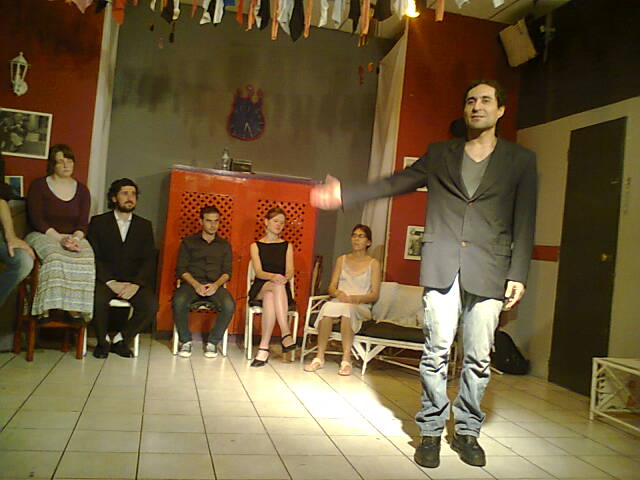
We all need to work towards clear objectives. First the group appears. They get to know each other limbering up body, voice and soul. Then the story appears.
"Dramatic literature requires a responsiveness, not just of mind,but of the whole body," says S.W.Dawson, "so that the whole work realize itself."
At one point it becomes necessary to invite spectators--that's how actors measure their achievements,that is the objective--to test their achievements in front of an audience.
Most of the participants in our demonstration class of theatre in English have had little or no previous acting experience. They have joined the workshop to improve their language and learn creative techniques.
if you like the idea why not drop by.
November 30th at 4pm, 2444 Mendoza
street in Buenos Aires or contact:
hopalfred@gmail.com
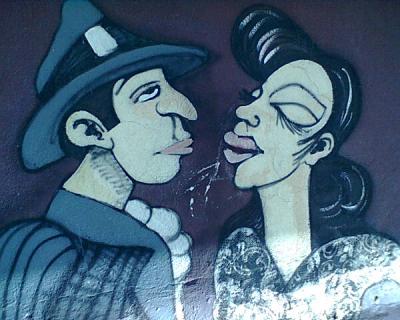
Stage and Camera Workshop announces:
Muestra de Teatro en Inglés
30 de noviembre y 7 de diciembre
A las 16 horas
”An Inspector Calls” J.B. Priestley
Versión abreviada, narrada, filmada y actuada por el
elenco de Stage and Camera sobre un inspector que
investiga la responsabilidad moral de una familia en
la muerte de una mujer que trabaja en la fábrica de
la familia Birling.
“A Blind Date” anonymous
Una comedia actuada y filmada sobre una joven actriz
elegante y exigente y un ingeniero de gustos ordinarios
que se conocen mediante una agencia. Desencuentros,
sorpresas y un final de película.
Con la supervisión del profesor Alfred Hopkins y la
asistencia de Kiran Sharbis
Teleactuar Mendoza 2444 (esquina Cabildo), CABA
Información y reservas: hopalfred@gmail.com /
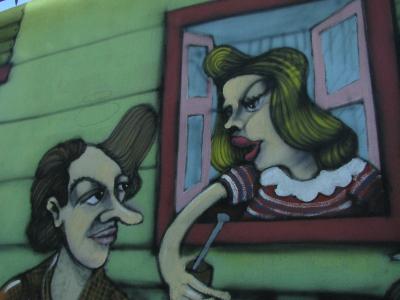
The Hopkins Creative language Lab has announced two free demonstration classes of theatre in English Saturday April 6th and Saturday April 13th in Buenos Aires City, designed for persons with or without acting experience, students and teachers of English and the general public.
The event on April 6th will be held at 12:30pm at the Faro theatre in Buenos Aires City, 2151 Moreno street 2-B. Those who would like to do so are invited to come prepared to present brief monologues, stories or humoristic pieces, although guests may choose to only participate in the drills and drama games or simply watch the class. There will be drills on breathing, use of voice, body expression, drama games and improvisations.
Acting before cameras The second free demo class will be on the following Saturday, the 13th, at 4pm, at the Taller Sol, Mendoza 2444, near Cabildo avenue.
The idea of the workshops, led by a coach native of Los Angeles, California, is to accumulate acting and creative skills as an essential tool for sharpening diction, fluency and command of English.
This year the workshop will prepare a show for English schools and likewise work on the possibility of creating TV type programs for posting on the web.
For further information, those interested may call 4342 3588 or write hopalfred@gmail.com
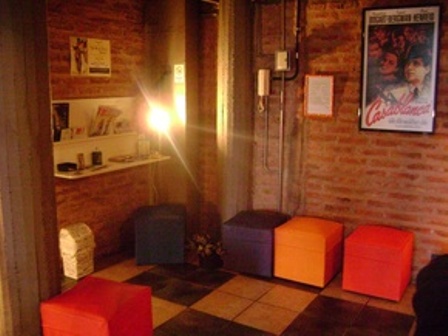
Summer is a time for learning in a more relaxed environment. Bearing that in mind the Färo theatre is organizing a workshop every other Saturday, starting Jan. 12th, acting out songs. The only requirement is an intermediate to advanced command of English.
"Participants are asked to bring in their favourite song," explained the California born coach of the event. "After working on voice and body expression, games, role-play and improvisations will be organized for the songs worked on during each encounter. The activity is aimed at enhancing vocal and physical expression but likewise uses acting technique to develop concentration, self confidence, projection, use of space and characterization."
The workshops will be held on January 12th and 26th and February 9th and 23rd, from 4 to 8pm. at the Färo theatre, 2151 Moreno street 2-B, Buenos Aires City. Participants can participate in as many workshops as their schedule permits, because each activity will be complete in and of itself and the $175 peso fee for each class will be charged during each encounter.
Those persons who would like more information on the workshops are asked to write hopalfred@gmail.com or to call 4342 3588.
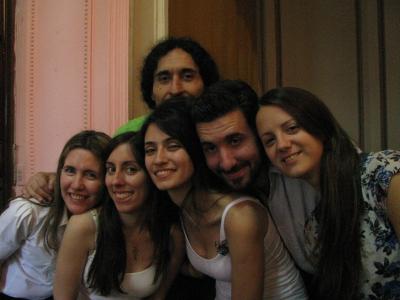
It happened last Sunday evening. Everyone seemed to arrive at once: the actores, the spectators, the girl in charge of the lights, the coach, the directress of the Faro Company. Nora went about putting the last touches on her "Leg of Lamb." Kiran Sharbis was in a tet-a-tet with his acting companion, Verónica. Jessica, the social worker was dressed splendly, Marcia, the poor Italian immigrant mother began to move about with her "other" body; Cecily, looking as smart as could be in her business suit, asked the coach if her red carpet would fit in her role as narrator in "The Lover," and Gwen, Natalie and Gideon calmly went about putting the finishing touches on their costumes. "The Theatre Game" was about to begin.
How would a housewife, deeply in love with her husband and six months pregnant, react should her husband gruffly annouce his plans to divorce her? You'd have to see the Hopkins theatre workshop students version of "A Lamb to Slaughter." Perhaps one of the most telling moments was that blow, when she crashed the icy leg of lamb against the dense forest of hair covering her husband's head.
Most critics do not consider Tennessee Williams' short play, "The Dark Room" to be a comedy. But the encounter between the representative of the state and the poor mother of Italian extraction certainly contains elements of irony. A pregnant 16 year old daughter pregnant, alone in a dark room, only seeing her ex-boyfriend (in turn married to another woman) certainly carries the seed for irony. Perhaps the play also serves to take a deeper look at how the welfare system works in the United States.
What happens the day after? That is, the day after the marriage? The lives of the bride and groom have suddenly changed. What are their joys, what are their fears, what are their freak-outs? Actually, that's only half the story. "The wedding," a creation based on a simple text, pits an actress convinced of her professionalism against an actor who seems not to take his role seriously (or perhaps is more serious about impressing his acting mate than playing his role). What would the great theoreticians of acting technique say about the dilemma?
And then: "The Lover," a readapted version of Harold Pinter's play. Theatre is a game, they say. To act is to play. But what about life? Is it not also a game? Richard is tired of the game he has been playing with his wife. He wants out. They have each become the "lover" or the "mistress." How can such a situation be resolved? The workshop students invented another character: a maid who secretely falls in love with the husband. So you have the typical (typical?) trio. That doesn't necessarily mean the end is "typical."
If you want to see these skits you would do well to meander down to the Faro theatre December 15th at 8pm. The address? 2151 Moreno street 2-B. The performance is free, although a hat appears after the clapping is over. If you speak English and like to play you might also like to participate in the games and improvisations previous to the performance!
By the way: if you have managed to read this far you might be interested in a summer activity being planned at the Faro theatre: an acting out songs workshop January 12 and 26 from 4 to 8pm. Songs often are stories, with characters, conflicts. Why not look for the characters, invent the plot and act out the idea with your fellow workshop companions?
Contact: hopalfred@gmail.com
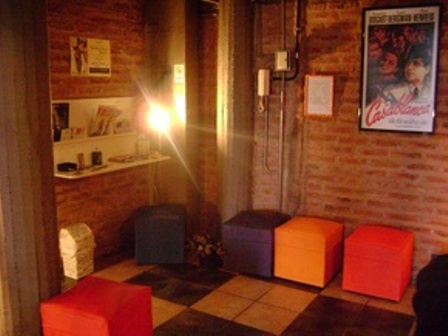
The Faro theatre announces "The theatre game," two demonstration classes of theatre in English, including four short plays at 8pm Sunday December 2nd, and Saturday December 15th, at Moreno 2151 2-B, Buenos Aires City.
The program includes a free version of Dahl’s "A lamb to slaughter;" "The dark room," an adapted version of the Tennessee Williams play; "The wedding," an improvisation, and "The lover," an adapted version of Herald Pinter’s play.
There will also be games and improvisations with audience participation.
The event is open to the general public and represents the work done during the year by the participants in the Hopkins Theatre Workshop, which operates at the Faro theatre.
During the summer the workshop will carry out a series of encounters improvising songs. The idea is to work on the characters and plots which appear in popular songs and then improvise and create dramatic structures based on the lyrics.
For more information on the demonstration classes and the summer activities, those interested should consult:
hopalfred@gmail.com or facebook: Alfred’s wonderland theatre workshop.
Phone: 4342 3588 or 1562521028.
Is there any common ground between theatre and sports activities? Here is what a number of important dramaturgists have said:
Martin Esslin: "Theatre can be seen as a spectator sport. And if you watch a very great actor like Laurence Olivier you will notice that his evident enjhouyment of the physical aspects of acting (as when be balances on the edge of a chair, fixing a light bulb in O?Neill’s LONG DAY’S JOURNEY INTO NIGHT or tumbles down a long flight of steps as the dying Coriolanus, not to mention the vast voice range in his Othello) forms a decisive element in his impact as weel as in his approach to the art of acting."
Eugene Ionesco: "We should go to the theatre as we go to watch football, boxing or tennis. Indeed, a sporting match gives us the most exact idea of what the theatre is in its purest state: live antagonism, dynamic conflict, the motiveless class of opposing wills."
Paul Bellugue: "Because sport has as a consequence, if not a goal, the perfecting of bodily gestures, it teaches essential laws of the art of living, in teaching those of art."
Etienne Decroux: "One does not modernize a monument in order to conserve it. One must therefore conserve the body which was strong, siillful, ascetic. What will conserve it? Sport is not one of the beaux arts. One gives oneself to it only to vanquish others. Dance is not a portrait of struggle. Old-fashioned pantomime is not an art of the body. Corporeal mime is more than a diversion. If it survives, the world will survive."
Eugenio Barba: "When Occidental performers want to be energetic...they often begin to move in space with tremendous vitality...(using) huge movements, with great speed and muscular strength. And this effort is associated with fatigue, hard work. Oriental actors (or great Occidental actors) can become even more tired almost without moving. Their tiredness is not caused by an excess of vitality, by the use of huge movements, but by the play of oppositions. The body becomes charged with energy because within it is established a series of differences of potential which render the body alive, strongly present, even with slow movements or in apparent immobility."
(The quotations are from "Theatre and Sport" a mime journal edited by Thomas Leabhart, copyright 1996)
Vsevold Meyerhold:
Here are some thoughts by Vsevold Meyerhold, the Soviet advocate of biomechanics: "A skilled worker at work invariably reminds one of a dancer; thus work borders on art. The spectacle of a man working efficiently affords positive pleasure. This applies equally to the work of the actor of the future." And: "When we admire a child's movements we are admiring his biomechanical skill." And: "Any manifestation of a force (including the living organism) is subject to constant laws of mechanics (and obviously the creation by the actor of plastic forms in the space of the stage is a manifestation of the force of the human organism."
Constant Benoit Coquelin, French actor: "Every art has its different instruments;but the instrument of the actor is himself. The matter of his art, that which he has to work upon and mould for the creation of his idea, is his own face, his own body, his own life. Hence it follows that the actor must have a double personality. He has his first self, which is the player, and his second self, which is the instrument. The first self conceives the person to be created...and the being that he sees is represented by his second self. This dual personality is the characteristic of the actor."